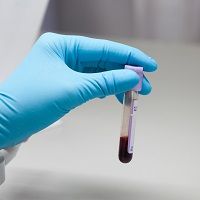Blood Test Guides Individualized Pancreatic Cancer Treatment
Testing for the CA 19-9 tumor marker is especially important for early stage pancreatic cancer patients, but only about 20% of patients receive the test, according to findings presented at the Western Surgical Association meeting in November 2015 in Napa, CA.

Testing for the CA 19-9 tumor marker is especially important for early stage pancreatic cancer patients, but only about 20% of patients receive the test, according to findings presented at the Western Surgical Association meeting in November 2015 in Napa, CA.
Researchers from the Mayo Clinic studied outcomes for 97,000 patients to examine the impact of the CA 19-9 test, an inexpensive blood test (approximately $170) used to predict whether a patient is likely to have a better or worse outcome compared to average.
The test is also used to then develop individualized treatment guidelines, the researchers said. Most people are eligible for the test, but it is true that 10% of people do not produce the tumor marker. Patients who both did and did not secrete CA 19-9 were included in the study.
About one in five pancreatic cancer patients actually received the test, and people whose blood sugar showed higher than typical CA 19-9 levels demonstrated worse outcomes than others at the same stage of cancer. The researchers were surprised to learn that the elevated levels of CA 19-9 negatively affected survival in patients who were diagnosed at an early stage, according to a press release. Plus, they said, fewer patients than expected were tested for CA 19-9 at diagnosis.
“This is another argument for giving chemotherapy before surgery in all pancreatic cancer patients and ending the old practice of surgery followed by chemo,” senior author Mark Truty, MD said in the statement. “The study answers an important clinical question and applies to every pancreatic cancer patient being considered for surgery.”
The CA 19-9 test has been used at the Mayo Clinic for years. Without the use of the test, the patients may be subject to surgeries that end up not benefitting them in the long term, the authors continued.
“Our conclusion is that every patient should have a CA 19-9 test at diagnosis,” Truty said. “This is a simple, cheap and widely available test that allows personalization of pancreatic cancer treatment care. Further, patients with any elevation of CA 19-9 should be considered for preoperative chemotherapy to eliminate this risk.”